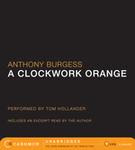
 The Children Of Men
The Children Of Men
By P.D. James; Performed by John Franklyn-Robbins
9 CDs – 10.5 Hours [UNABRIDGED]
Publisher: Recorded Books
Published: 1993
ISBN: 1419323431
Themes: / Science Fiction / Infertility / Dystopia / Sociology / Politics / Terrorism / England /
“O’ merciful God and heavenly Father, who hast taught us in thy holy Word that thou dost not willingly afflict or grieve the children of men, look with pity, we beseech thee, upon the sorrows of thy servant for whom our prayers are desired. In thy wisdom thou hast seen fit to visit him with trouble, and to bring distress upon him. Remember him O Lord in mercy; sanctify thy fatherly correction to him; endue his soul with patience under his affliction, and with resignation to thy blessed will; comfort him with a sense of thy goodness; lift up thy countenance upon him, and give him peace; through Jesus Christ our Lord. Amen.”
-English Book of Common Prayer
Set in 2021, The Children Of Men posits a future in which not a single human child has been born for more than two decades. In the year Omega, the last year for babies, there began a frantic search for the inexplicable cause of human infertility. Twenty years later they’ve all but given up. The “Omegas,” as the youngest generation are being called, are spoiled, egotistical and violent. The middle-aged who’ve appear to have lost their purpose are all either visiting the state sponsored sex-shops or raising animal proxies as their children (kitten baptisms is all the rage in London these days). The elderly teetering on the edge of a social system increasingly disinterested in them are encouraged to suicide at the slightest hint of infirmity. Leading Britain through this crisis is the long time “Warden” of England, a man named Xan Lyppiatt. Xan is an all-but-dictator who has the confidence of the people. Xan’s cousin is Theo Faron, an Oxford history professor who lives under a cloud of self-recrimination for the death of his son. Into Theo’s life comes a woman named Julian, who on behalf of herself and her underground movement wants Theo to take a message to the Warden. Sadly, the message falls upon deaf ears and Theo expects never to see Julian again. But he does when in an unprecedented revelation Theo is given conclusive proof that the impossible has happened, Julian is pregnant.
The Children Of Men is a ponderous and elegant rumination on topics rarely tackled in Science Fiction. Though P.D. James does nothing to conclusively indicate an overt idea behind the novel’s premise, we can’t help but wonder. Is this fact of the infertility and the fact of a pregnant woman not a contradiction? Are we to conclude this was a freak mammalian parthenogenesis? What else could cause such a pregnancy? James undercuts this line of argument with one plot point and with another she reinforces it. But it wasn’t just the living men who are infertile. Oh no, for what are we to make of the fact that in James’ future even the healthy sperm, frozen well before the “Omega Year,” has been rendered impotent? Clearly the lone pregnancy, as it is laid out, bears some resemblances to the biblical story of the Virgin Mary. But James downplays it. Perhaps we are to conclude both from the books title that the infertility crisis is something akin to a modern day world-wide-flood event. Should we be wondering if the society in The Children Of Men is being punished for something? If we are to take this what-if and run with it, we must then ask what the famous Scottish skeptic-philosopher David Hume demanded, and wonder if uniformity has been violated? Irregardless, the questions themselves are valuable, and the environment in which the are asked is possibly unique and certainly interesting. For some, The Children Of Men‘s ending may make them see it as a hopeful novel, but I believe the ending is more in the tradition of what you see is in it is what you bring to it. For the deliberately childless, what changes? Perhaps nothing, perhaps something.
Narrator John Franklyn-Robbins is asked to shift between first and third-person narration. He does so, with characterization all but non-existent. This is what old-school audiobook aficionados like to call a “straight” reading. His accent is the prime attraction, and casts the entire novel is a completely different direction than the 2006 film version. Listeners should persevere through the slow start as they will be well rewarded later on. Recorded Books does not showcase it’s original art on its website so the arrival of the actual audiobook is always a surprise. This one’s got their older style line art which I’ve always appreciated.
Posted by Jesse Willis

 The latest issue of the Radio Times offers a peek at next week – On BBC Radio 3 in The Essay timeslot will be a “3 part examination of utopian visions of the future……” entitled The Future’s Not What It Used To Be… quite a number of SF classics are quoted in the Radio Times article, so this should be a worthy listen. Here’s the official description:
The latest issue of the Radio Times offers a peek at next week – On BBC Radio 3 in The Essay timeslot will be a “3 part examination of utopian visions of the future……” entitled The Future’s Not What It Used To Be… quite a number of SF classics are quoted in the Radio Times article, so this should be a worthy listen. Here’s the official description:







